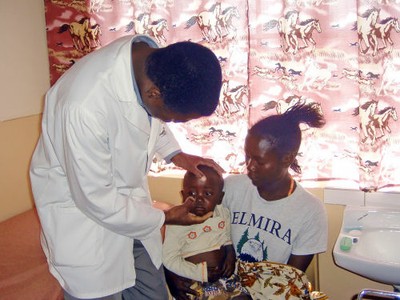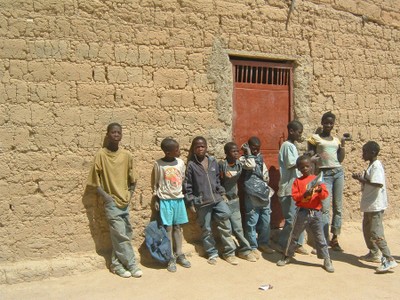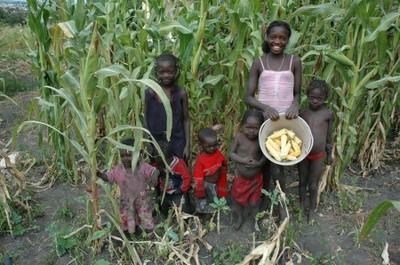Angola – SOS Medical and Social Centres
In Angola there are currently three Social Centres and three Medical Centres for children and the local community, in Huambo, Benguela and Lubango. Social Centres sometimes operate via Family Strengthening Programmes, which aim to support the wider community. Medical Centres provide treatment and services for the local community. In Africa, HIV/AIDS is a major focus for treatment. Below is some information about some of the Medical Centres that SOS Children runs in Angola.
SOS Medical Centres around Angola: In-Depth
 Lubango
Lubango
Description of SOS Medical Centre:
At the SOS Medical Centre, more than 500 patients receive treatment per month.
Work and achievements:
In 2009, the SOS clinic was once again a refuge for the population who could find in our clinic easy access to the highly sought after and very expensive anti rabies vaccine. In addition to this, the active participation of the clinic in the massive child vaccination campaigns has been of remarkable help to reach the most deprived communities surrounding the SOS Village. Internally, regular home visits continue to be organised by clinic staff to make children remember basic health prevention measures, such as hand washing with soap.
Huambo
Description of SOS Medical Centre:
The SOS Medical Centre (mother and child clinic) will offer medical care and assistance to up to about 800 children and 400 adults. The SOS Social Centre has already been running its family strengthening programme since 2008, focussing on a package of services especially for HIV and AIDS affected families. In collaboration with communities and local authorities, families receive support to build their capacity to protect and care for their children (e.g. income generation, parental skills) and to gain access to essential services (e.g. education, medical care).
Benguela
Description of SOS Medical Centre:
The SOS Medical Centre has a capacity of about 500 comprising two examination rooms, a surgery room, two wards (each to accommodate ten patients), a waiting room and a kitchen. The main aim of the family strengthening programme is to help children at risk of losing their natural family environment by strengthening their families' ability to care for them. This includes educational scholarships, provision of school material and school uniforms, medical support and promotion of income-generating activities. Moreover, a local orphanage receives material support through the family strengthening programme.
Work and Achievements:
As part of our efforts to participate with the global task of reducing the highest maternal and infant mortality rate in the country, two medical components were added to the centre in 2009 namely, the pediatric and prenatal component. In this way, the Centre has become a health care provider for children as they can now even get regular checkups. In addition, knowing that newborns are particularly vulnerable and children are vulnerable to malnutrition and infectious diseases, many of which can be effectively prevented or treated, pregnant moms are being encouraged on the need to have at least 12 prenatal visits during their pregnancies.
The Centre also provides a variety of health promotion and illness prevention services which focus on addressing and raising awareness of health related issues. Diabetes and injuries have become a concern. The Centre healthcare staff members have therefore started encouraging the SOS family members to get tested for diabetes and live a healthier lifestyle and promoting healthy eating habits, staying active, aiming to reduce the family’s risk of getting Type 2 diabetes. Injuries prevention is conducted under the Centre’s heading of violence prevention and the safe play awareness campaign among children from the Village and affiliated facilities.
SOS Social Centers around Angola: In-Depth
 Lubango
Lubango
Description of SOS Social Centre:
The family strengthening programme in Lubango, Angola, started in 1994 as an emergency relief programme. At that time, interventions revolved around immunisation campaigns, feeding centres and literacy programmes.
Work and Achievements:
In 2005 a realignment process was started for the programme to start preventing child abandonment through the strengthening of vulnerable families instead. This resulted in a major shift from a welfare approach to a more developmental one. The programme is currently being implemented in the Mapunda, Calumbiro and Sra do Monte areas. Those areas were selected according to the high numbers of orphans and vulnerable children, limited resources to respond effectively to the problems faced by them, their proximity to the existing SOS Village. As at December 2009, the programme has been provided packages of services to a total number of 464 children beneficiaries from 111 families.
Eradicating poverty is clearly the biggest social challenge all FSPs are facing. Over the last three years there has been enormous struggle to support families out of the welfare to a more developmental approach though vocational training, individual loans and other individual income generating activities. In Lubango, an opportunity to increase family resources arose when the SOS Village invited the FSP to implement agriculture activities in the existing farm land. Like many other Angolan families, a significant number of our beneficiaries live on agriculture. The peculiar place where the Village is located with plenty of land and water was therefore particularly attractive to the 41 family beneficiaries who were initially involved in poor agriculture practices in the backyard of their homes with very limited outcome.
The 41 families have aggressively cultivated the parts of land to obtain enough products for self consumption and selling. They are currently not working as cooperative yet. Each family has been allocated a small portion of land where they plant their seeds with the support from the programme resources. The first harvest of vegetables was very encouraging and families agreed to reinvest at least twenty per cent of the income in buying more vegetables seeds and maize which in turn significantly improved the production during the second harvest. The immediate impact of this initiative on the lives of the children can be seen on the daily diet where the involved families can now cater for at least two hot meals a day.
 Huambo
Huambo
Work and Achievements:
In July 2009, the FSP Huambo embarked on the initiative of bringing together collective action and mutual assistance around a collective flour mill programme. This is another income generating project of FSP Huambo that was established for the purpose of generating employment and income for beneficiary families. The flour mill machine was purchased to help families produce enough maize flour for self-consumption and selling. The flour mill is being managed by elected beneficiaries from the community-based committee including 4 women members and they have established a treasure for the income and expenditure bookkeeping which is supported by the FSP Coordinator. 2 beneficiary members were trained in producing flour and as a result, in less the one month of operations the mill has already produced 1,783 kilos of maize flour which is enough for the families’ use and for small quantity sales. The programme involves the whole 38 FSP family beneficiaries and the generated income from the mill activity will be used for covering the running costs as well as for the promotion of a microcredit social fund to support other family business initiatives, as per their development plan. To boost the maize flour production among beneficiaries, community members are provided with seeds and agricultural input and also receive technical orientation on appropriate procedures regarding cultivation and the collecting and storing of the product. In addition, FSP beneficiaries have the privilege to benefit from highly subsidized prices to boost their business in the reselling of the product. The project is also expected to benefit local flour distributors and users by providing cheaper and fresher flour.
Benguela
Work and Achievements:
The programme serviced 207 children beneficiaries from 55 families. Although many children can still enjoy living with their family of origin and benefit from a safe habitation and the minimum three meals a day, the child’s rights monitoring tool implemented in 2009 revealed still lack of capacity on the side of many caregivers in ensuring early birth registrations and provide for the child’s educational. Hence the facilitation from the FSP administration in securing 16 birth registration certificates for the children and ensuring 80% academic success among the students through extra individual support from hired teachers. However, FSP demographics show beneficiaries still needing immediate vocational orientation. There are 66 adolescent beneficiaries above the age of 15 who missed appropriate school enrollment age and are either not attending school or struggling to complete their primary education. These children did not receive the necessary education stimulus and support. In fact, they were sometimes even encouraged to stay in the streets as beggars or perform odd street businesses such us car washing, transportation of goods, sealing… among them are girls who have already fallen into an early pregnancy. 33 adult beneficiaries are living in the same programme families’ households most of whom unemployed and performing casual activities. The National Association is therefore strategizing the implementation of a vocational centre attached to the HG School in Benguela to support the integration needs of this particular target group.

 Return to Schools Wikipedia Home page…
Return to Schools Wikipedia Home page…
